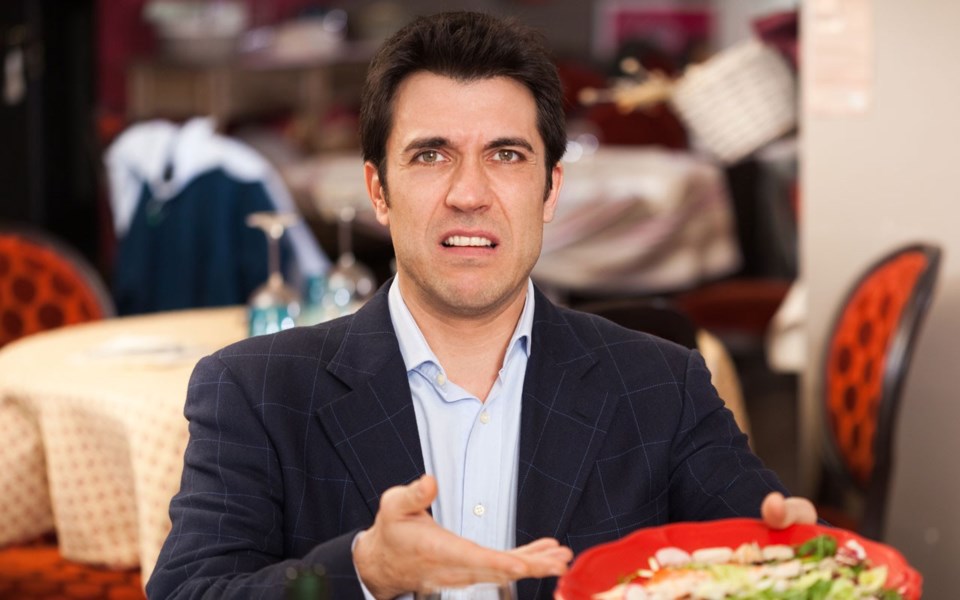In the film Canadian Bacon, there's an iconic scene where John Candy plows through a festival crowd in Toronto, sending bodies flying in all directions—and everybody he pushes over apologizes to him. It was a joke based on a stereotype, the absurd politeness of Canadians, but there was a nugget of truth to it.
I once saw two guys get into a bar fight in Halifax, after which the winner crawled around on the sticky floor beside the loser to help him find a contact lens. I saw a Vancouver police officer apologize profusely to a raving addict who tried to bite him after he accidentally bumped his head on the side of cruiser. I myself have been known to apologize for calling people with work questions during working hours.
I love that about Canada, even if it's a little less true now than it was a generation ago. People are less polite these days, especially to people working on the front lines. Living in Whistler, we see examples of rude, unfriendly behaviour every day—at hotel desks, in restaurants, on the mountains, in traffic, and everywhere else.
It's not your imagination. Surveys in Canada, the U.S., England and elsewhere find that people find other people to be ruder than ever before. It's not isolated to one region or demographic, it's an across-the-board decline in social civility. And it sucks.
Some people take anything that goes wrong personally—they react to bad news, whether it's a long wait for a table or the fact that they don't have your size in the back, like a slap in the face. Or they live in bubble, paying more attention to their phones than the person waiting for their order or the people standing behind them in line.
Everyone should know the golden rule by now—treat others how you wish to be treated—even if some people choose to ignore it. Fewer people say please, thank-you, you're welcome, make eye contact, or treat life's minor inconveniences with the patience and understanding that's required. Sometimes people will say nothing, which is almost ruder in a way—turning your back on someone and stomping away is nothing short of "eff you" in body language. And they're getting away with it.
Why is this happening? And more importantly, how can we fight it? How can we make the ridiculously polite Canadian stereotype true once again?
I have one theory on the why. It's this insane idea that the customer is always right, even when they're clearly wrong, it's nobody's fault, or it's really not that big of a big deal.
It's the guy who screams the loudest when his flight is cancelled who gets the largest airline voucher and the upgrade to business class. It's the angry woman whose steak is medium-well instead of medium-rare who gets the free appetizer and drinks, and her ass kissed by mortified staff to boot. It's because review sites give vengeful people the power to hurt, or even destroy, businesses if their impossibly high standards aren't met for whatever mood they happen to be in that day.
Society is rewarding and validating rudeness at every turn, and it's spreading like a virus. Of course it is—why be polite if politeness gets you nowhere and in some cases is penalized?
Which brings me to my theory of how we can fight this: stop rewarding the loudest, rudest complainers with the biggest perks. Stand by employees and empower them to demand a reasonable amount of politeness from customers. Brave the negative reviews and fight back if people unjustly try to trash your business online.
And if you're another customer watching a front-line worker get abused, speak out and show your support. Back up their side of the story to the manager when they inevitably make an appearance. If you have the high ground, use it—fight rudeness with a little rudeness of your own.
Everyone should apologize for things that go wrong and take steps to make those things right—that is the polite, Canadian thing to do—but there needs to be a limit. If someone gets angry and abusive, ask them to moderate their tone or leave. If they continue to rant about something you already apologized for, cut them off. If they leave you a negative review, fight back.
Maybe it's time to reward politeness instead of rudeness—give calm, understanding customers more time and perks than the rude ones. Give them the free appetizer or the upgrade to business class and reinforce good behaviour. Show all the rude people out there that politeness and civility have a point.
Ironically, this goes against what some Whistler employees are being taught. We did have a bit of a customer-service issue once upon a time and brought in all kinds of programming that reinforces the "customer is always right" trope. Maybe it's worth revisiting those lessons ... providing awesome customer service shouldn't result in more awful customers.




